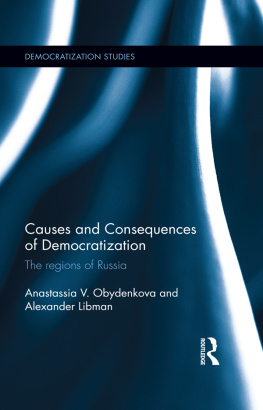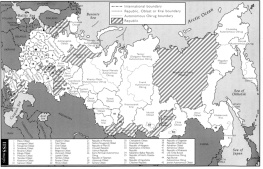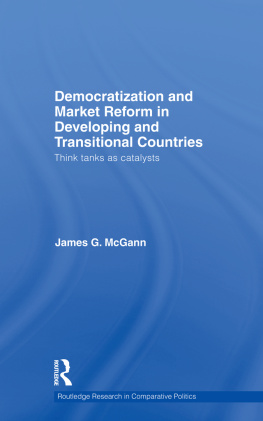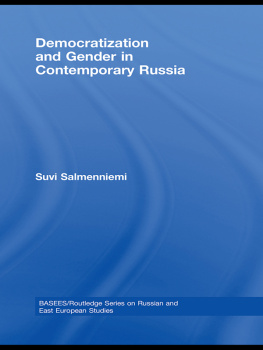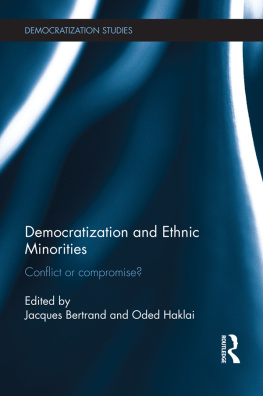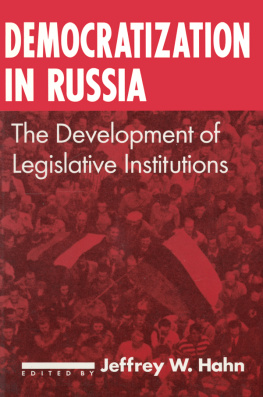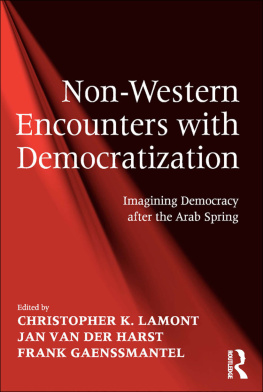Anastassia V Obydenkova - Causes and Consequences of Democratization: The Regions of Russia
Here you can read online Anastassia V Obydenkova - Causes and Consequences of Democratization: The Regions of Russia full text of the book (entire story) in english for free. Download pdf and epub, get meaning, cover and reviews about this ebook. year: 2015, publisher: Routledge, genre: Politics. Description of the work, (preface) as well as reviews are available. Best literature library LitArk.com created for fans of good reading and offers a wide selection of genres:
Romance novel
Science fiction
Adventure
Detective
Science
History
Home and family
Prose
Art
Politics
Computer
Non-fiction
Religion
Business
Children
Humor
Choose a favorite category and find really read worthwhile books. Enjoy immersion in the world of imagination, feel the emotions of the characters or learn something new for yourself, make an fascinating discovery.
- Book:Causes and Consequences of Democratization: The Regions of Russia
- Author:
- Publisher:Routledge
- Genre:
- Year:2015
- Rating:4 / 5
- Favourites:Add to favourites
- Your mark:
- 80
- 1
- 2
- 3
- 4
- 5
Causes and Consequences of Democratization: The Regions of Russia: summary, description and annotation
We offer to read an annotation, description, summary or preface (depends on what the author of the book "Causes and Consequences of Democratization: The Regions of Russia" wrote himself). If you haven't found the necessary information about the book — write in the comments, we will try to find it.
Causes and Consequences of Democratization: The Regions of Russia — read online for free the complete book (whole text) full work
Below is the text of the book, divided by pages. System saving the place of the last page read, allows you to conveniently read the book "Causes and Consequences of Democratization: The Regions of Russia" online for free, without having to search again every time where you left off. Put a bookmark, and you can go to the page where you finished reading at any time.
Font size:
Interval:
Bookmark:
(Formerly Democratization Studies, Frank Cass)
| 1 | Democratization and the Media Edited by Vicky Randall |
| 2 | The Resilience of Democracy Persistent practice, durable idea Edited by Peter Burnell and Peter Calvert |
| 3 | The Internet, Democracy and Democratization Edited by Peter Ferdinand |
| 4 | Party Development and Democratic Change in Post-communist Europe Edited by Paul Lewis |
| 5 | Democracy Assistance International co-operation for democratization Edited by Peter Burnell |
| 6 | Opposition and Democracy in South Africa Edited by Roger Southall |
| 7 | The European Union and Democracy Promotion The case of North Africa Edited by Richard Gillespie and Richard Youngs |
| 8 | Democratization and the Judiciary Edited by Siri Gloppen, Roberto Gargarella and Elin Skaar |
| 9 | Civil Society in Democratization Edited by Peter Burnell and Peter Calvert |
| 10 | The Internet and Politics Citizens, voters and activists Edited by Sarah Oates, Diana Owen and Rachel Gibson |
| 11 | Democratization in the Muslim World Changing patterns of authority and power Edited by Frederic Volpi and Francesco Cavatorta |
| 12 | Global Democracy: For and Against Ethical theory, institutional design and social struggles Raffaele Marchetti |
| 13 | Constructing Democracy in Southern Europe A comparative analysis of Italy, Spain and Turkey Lauren M. McLaren |
| 14 | The Consolidation of Democracy Comparing Europe and Latin America Carsten Q. Schneider |
| 15 | New Challenges to Democratization Edited by Peter Burnell and Richard Youngs |
| 16 | Multiple Democracies in Europe Political culture in new member states Paul Blokker |
| 17 | Globality, Democracy and Civil Society Edited by Terrell Carver and Jens Bartelson |
| 18 | Democracy Promotion and Conflict-based Reconstruction The United States and democratic consolidation in Bosnia and Afghanistan Matthew Alan Hill |
| 19 | Requisites of Democracy Conceptualization, measurement, and explanation Jrgen Mller and Svend-Erik Skaaning |
| 20 | The Conceptual Politics of Democracy Promotion Edited by Christopher Hobson and Milja Kurki |
| 21 | Ethnic Politics and Democratic Transition in Rwanda David Kiwuwa |
| 22 | Democracy and Democratization in Comparative Perspective Conceptions, conjunctures, causes and consequences Jrgen Mller and Svend-Erik Skaaning |
| 23 | The Comparative International Politics of Democracy Promotion Jonas Wolff, Hans-Joachim Spanger and Hans-Jrgen Puhle |
| 24 | Democratization and Ethnic Minorities |
Font size:
Interval:
Bookmark:
Similar books «Causes and Consequences of Democratization: The Regions of Russia»
Look at similar books to Causes and Consequences of Democratization: The Regions of Russia. We have selected literature similar in name and meaning in the hope of providing readers with more options to find new, interesting, not yet read works.
Discussion, reviews of the book Causes and Consequences of Democratization: The Regions of Russia and just readers' own opinions. Leave your comments, write what you think about the work, its meaning or the main characters. Specify what exactly you liked and what you didn't like, and why you think so.

